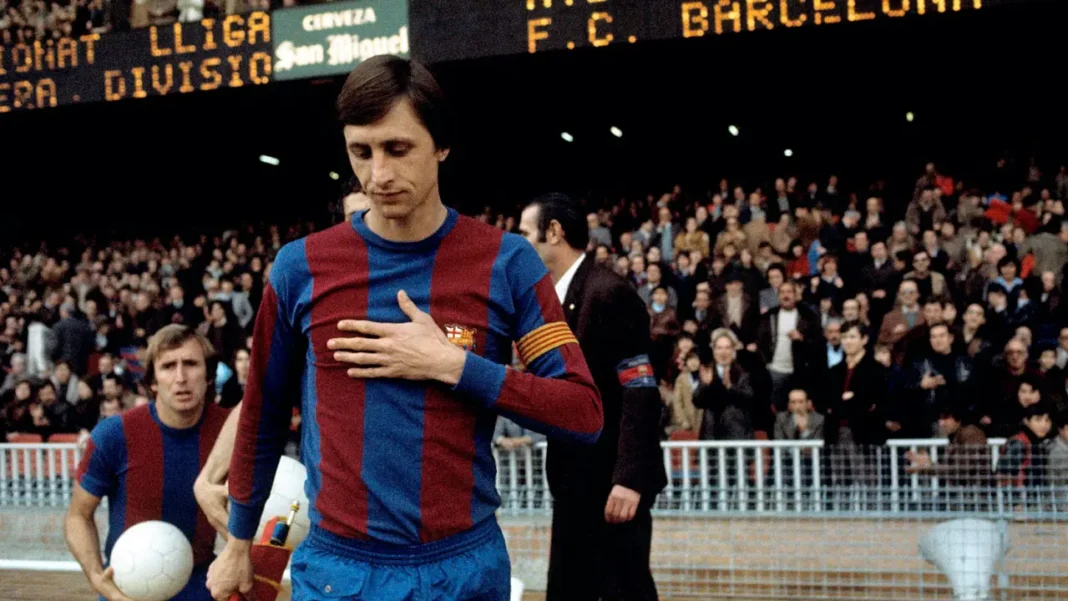There are moments in football that change the fate of a club forever. For FC Barcelona, that moment wasn’t a goal, a trophy, or even the signing of Lionel Messi.
It was the arrival of Johan Cruyff. And here’s the thing: Cruyff didn’t just change Barcelona once. He did it twice—first as a player in the 1970s, then as a manager in the late 1980s.
His impact went beyond trophies. He gave Barcelona a philosophy, an identity, and a style that still defines them today.
If you love Barça’s tiki-taka, La Masia graduates, or Pep Guardiola’s iconic team of the 2009–2012 era, you can trace it all back to one man: Johan Cruyff.
Let’s break down how Cruyff transformed Barcelona—first on the pitch, then from the sidelines.
Cruyff the Player: A Savior in 1973
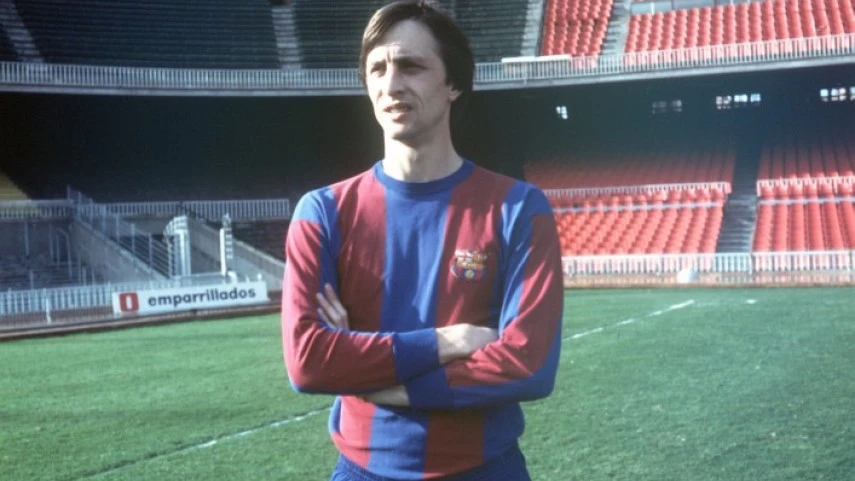
Barcelona Before Cruyff
Before Cruyff’s arrival, Barcelona were in crisis.
The club hadn’t won the Spanish league for 14 years. Real Madrid dominated, while Barça fans were losing hope.
The team had just two wins in their first seven games of the 1973 season and sat near the bottom of the table.
Fans were desperate. The headline in one Spanish magazine summed it up: “Cruyff: The only hope to avoid the chaos.”
Why He Chose Barcelona Over Real Madrid
Cruyff, already Europe’s biggest star after dominating with Ajax, could easily have gone to Real Madrid. In fact, Ajax wanted to sell him there. But Cruyff refused.
His reason? Ethics and identity. “Ajax sold me to Madrid, but I said: ‘I decide,’” Cruyff recalled. Instead, he forced a move to Barcelona, partly because he had already given his word, and partly because he wanted to fight Madrid’s dominance.
He even named his son Jordi—after Catalonia’s patron saint—at a time when it was politically sensitive.
The Impact on the Pitch
Cruyff debuted in October 1973, and everything changed. Barça went on a 22-game unbeaten run, eventually winning their first La Liga title since 1960.
One match stood out: the 5–0 win at the Santiago Bernabéu against Real Madrid. That wasn’t just a football match—it was a cultural and political statement.
For many fans, it felt like Barcelona had finally broken free from Madrid’s shadow.
Cruyff only won one league title in Spain as a player, but the shift in mentality was massive.
“With Cruyff, everything changed—the club as well as the team,” recalled his teammate Juan Manuel Asensi.
He introduced a new way of playing, a belief that Barça didn’t have to fear anyone.
Cruyff the Manager: Architect of a New Barcelona
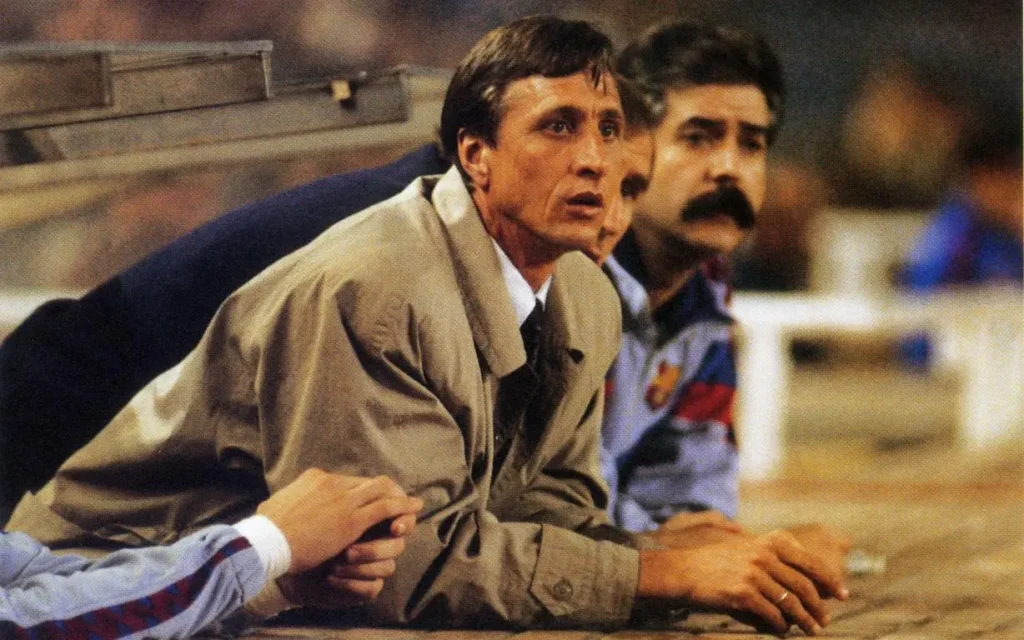
Barcelona in Crisis (Again)
Fast forward to 1988. Barcelona were in trouble once more—financially weak, politically divided, and poor on the pitch. The club needed more than a coach; they needed a visionary.
Enter Johan Cruyff.
Radical Football Ideas
Cruyff didn’t just set out to win games. He wanted to build a philosophy. He tore up old rules and redefined Barça’s identity. His approach was risky but revolutionary:
- Three defenders instead of four.
- Midfielders playing as full-backs.
- Attack as the first solution, not the last.
- Possession is the ultimate form of control.
His players were skeptical at first. “Is he mad or what?” laughed Txiki Begiristain, one of his wingers. But as Cruyff explained, they trusted him. Because he was Johan Cruyff.
Building the Dream Team
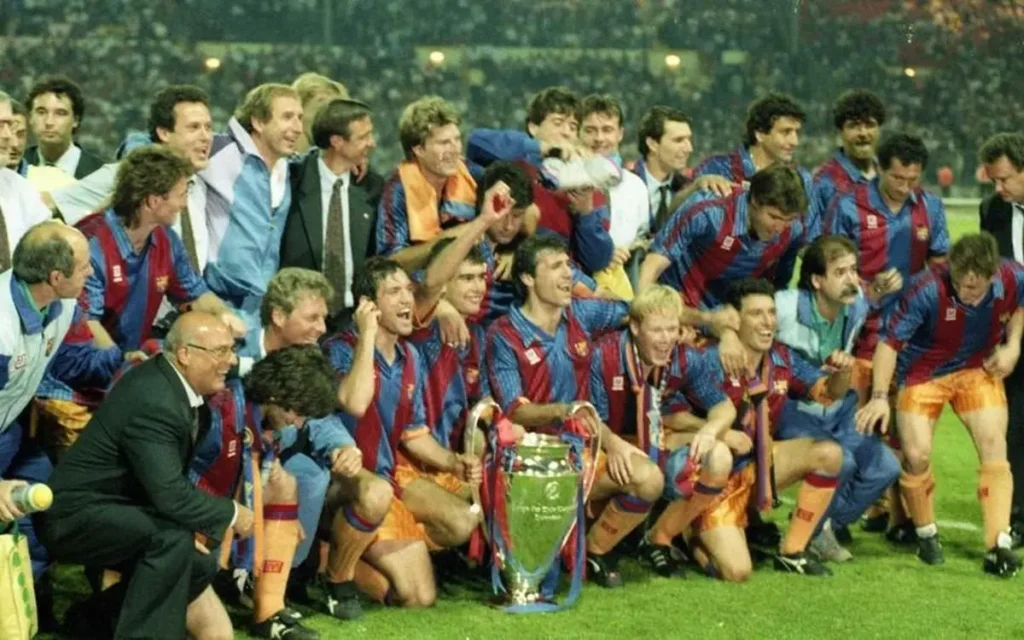
The results soon arrived. From 1991 to 1994, Barcelona won four consecutive La Liga titles. And in 1992, at Wembley, Barça lifted their first-ever European Cup by beating Sampdoria.
That night, before kick-off, Cruyff told his players just four words: “Salid y disfrutad”—Go out and enjoy it. That was his philosophy: football should be expressive, fearless, and beautiful.
His Barça became known as the “Dream Team,” with players like Pep Guardiola, Ronald Koeman, Michael Laudrup, and Hristo Stoichkov.
Redefining La Masia
Perhaps Cruyff’s greatest long-term impact came from his vision for youth development. Years earlier, he had advised Barça to create a proper academy—what we now know as La Masia.
When he returned as coach, he made sure the academy focused on technique, intelligence, and creativity, not physical size.
In the old system, players like Guardiola, Xavi, Iniesta, or Messi might have been rejected for being too small.
Under Cruyff’s philosophy, they became the backbone of Barcelona and Spain’s most dominant teams.
This was a complete break from European scouting trends at the time, where height and strength mattered most. Cruyff flipped the script: in his Barça, brains beat brawn.
Beyond Trophies: Cruyff’s Philosophy and Identity
Football as Art
Cruyff wasn’t just a coach; he was an artist. He believed football was about expression, about enjoying the game. “It is better to fall with your ideas than with someone else’s,” he once said.
Barcelona fans didn’t just watch football after Cruyff—they experienced it. He gave the club a style that fans identified with, something beyond wins and losses.
Political and Cultural Symbolism
Remember, Barcelona has always been “more than a club.” Under Cruyff, their football philosophy became part of their Catalan identity.
Playing attacking, creative football wasn’t just about winning; it was about expressing freedom, resistance, and pride.
His Lasting Influence
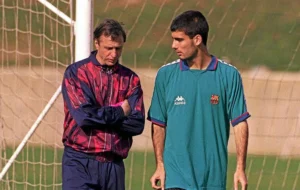
The numbers tell one story. Before Cruyff’s era as coach, Barcelona had 10 league titles and zero European Cups. Since his arrival in 1988, they’ve added 13 league titles and five European Cups.
But the bigger story is influence. Pep Guardiola, Xavi, and Luis Enrique—managers who later dominated Europe—were all shaped by Cruyff.
Even today, Manchester City under Guardiola plays a brand of football that feels like Cruyff’s ideas brought to life in England.
FAQs
Q: Why is Johan Cruyff considered so important to Barcelona?
Because he gave them both trophies and a philosophy. He turned Barça from underachievers into a club with a clear footballing identity.
Q: What was Cruyff’s biggest achievement as Barcelona manager?
Winning the 1992 European Cup—the club’s first ever—while building a style of play that inspired generations.
Q: Did Cruyff influence modern football beyond Barcelona?
Absolutely. His ideas shaped Pep Guardiola, inspired Spain’s tiki-taka, and can be seen in today’s Manchester City and Ajax.
Conclusion:
Johan Cruyff once said, “I’m not afraid of making mistakes. If you have an idea, try it. And if it goes wrong, don’t worry.” That fearless mindset became Barcelona’s DNA.
As a player, he rescued a broken club. As a manager, he built the Dream Team and redefined La Masia. And as a visionary, he left a philosophy that still drives Barcelona today.
There’s a reason people talk about “Before Cruyff” and “After Cruyff.”
Because when Johan Cruyff arrived at Barcelona, he didn’t just win trophies—he changed the club forever.

